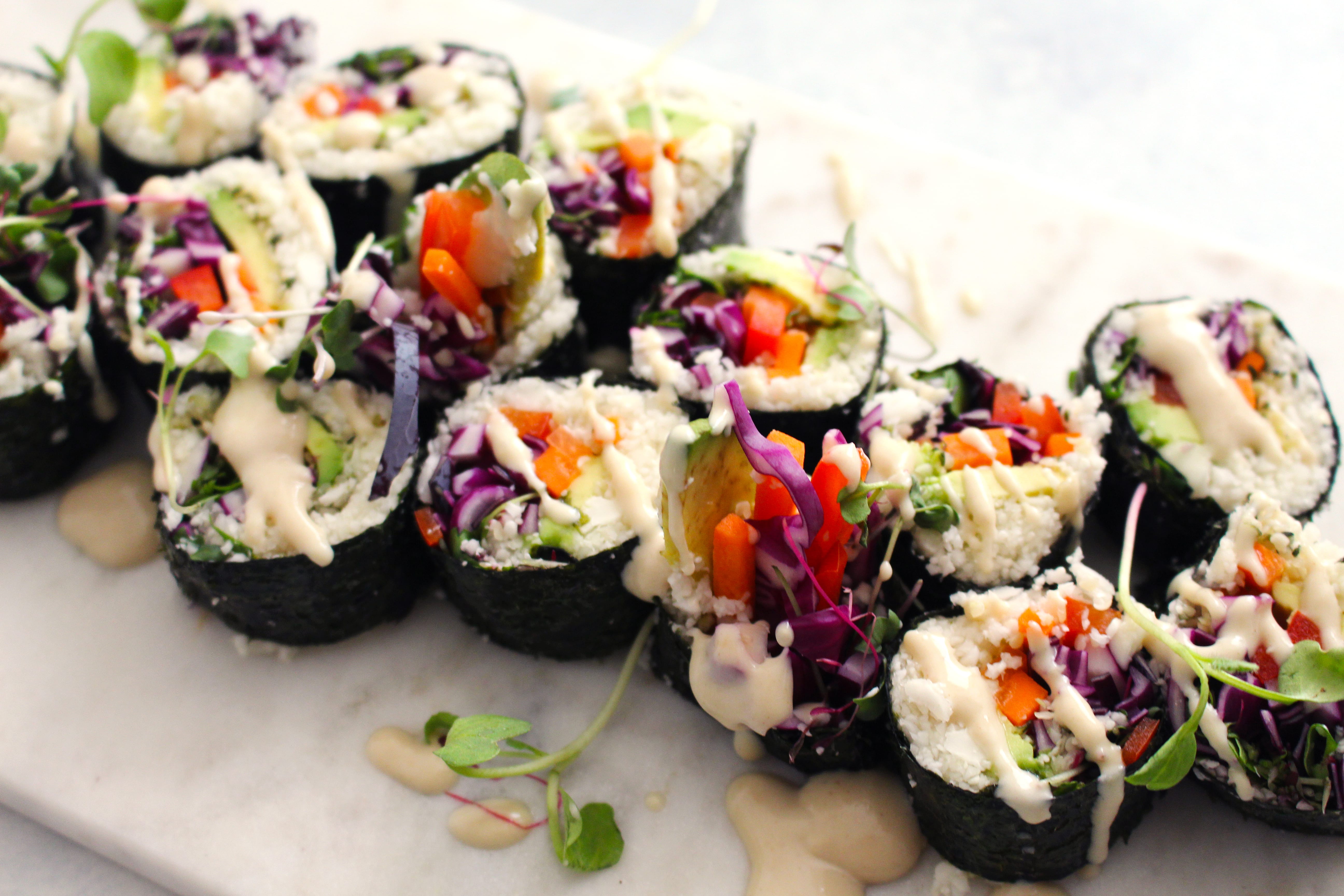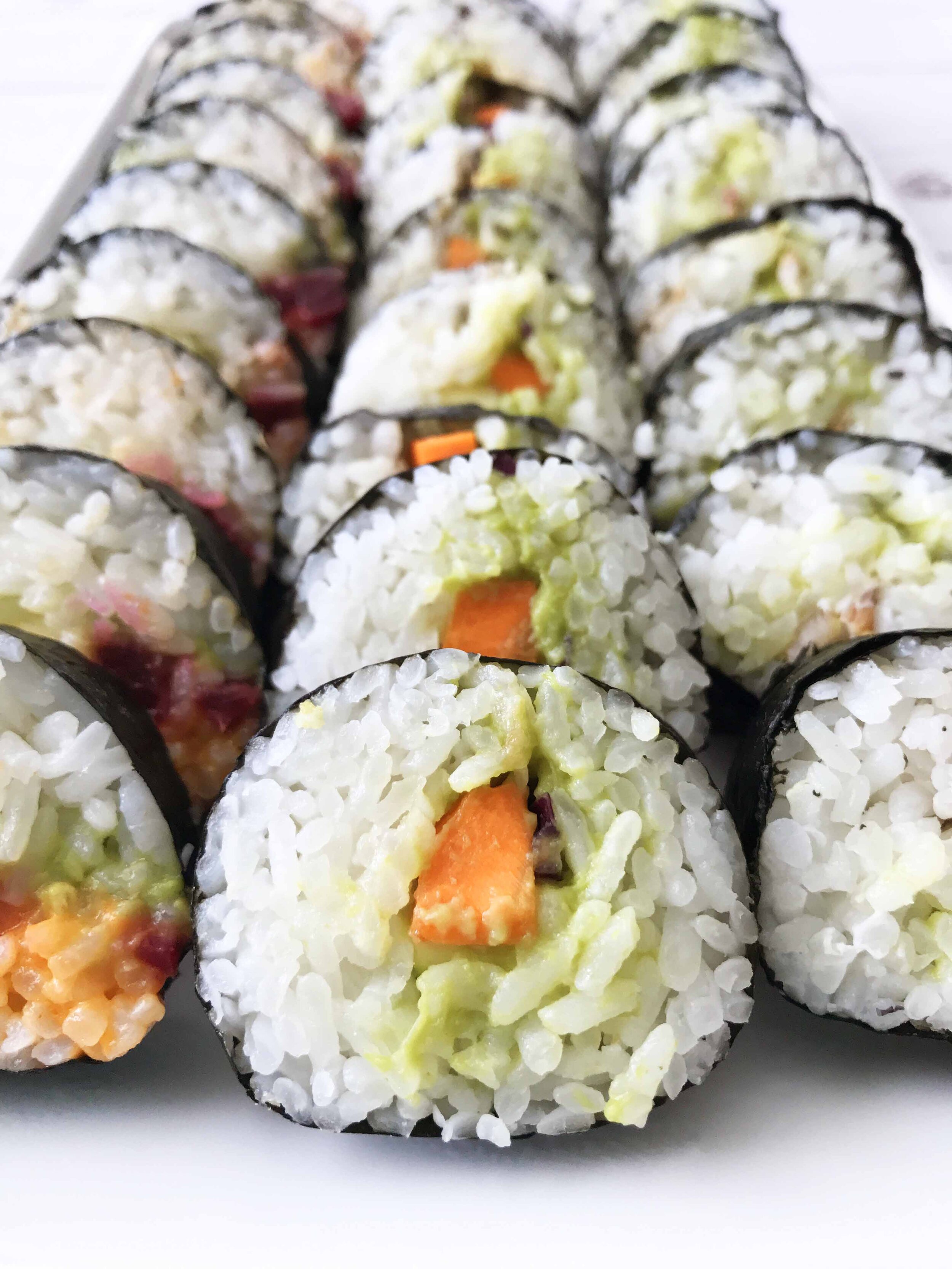
Introduction
Explanation Of The Popularity Of Sushi And The Misconception About It Being Non-vegetarian
Sushi has become a popular culinary delight enjoyed by people all over the world. It is commonly associated with raw fish, but this is actually a misconception. While traditional sushi does include seafood, many modern variations cater to vegetarians as well. Vegetarian-style sushi rolls are made using vegetables, tofu, and other plant-based ingredients, offering a delicious and healthy option for those who do not consume meat or fish.
The misconception about sushi being non-vegetarian may arise from the fact that some sushi varieties do use fish or seafood as a primary ingredient. However, there are numerous creative and innovative vegetarian sushi options available today. These rolls often incorporate ingredients like avocado, cucumber, carrot, and tofu, providing a variety of flavors and textures. Even for those who do eat meat or fish, vegetable-style sushi rolls can be a refreshing and flavorful choice.
A Brief History Of Sushi And Its Cultural Significance
Sushi has a long and fascinating history that dates back to the 9th century in Japan. It is believed that the concept of sushi was introduced to Japan by the Chinese during this time period. Originally, sushi was a method of preserving fish by fermenting it with rice. Over time, the fermentation process was abandoned, and sushi transformed into a fresh and delicious dish that showcased the flavors of the fish and other ingredients.
Sushi holds a significant place in Japanese culture and is often enjoyed as a form of art. The preparation of sushi requires precision and skill, and it is often served in minimalist and aesthetically pleasing presentations. In addition to its artistic value, sushi is also seen as a symbol of celebration and special occasions. It is frequently served during festivals and is considered a delicacy in Japan and around the world.
In conclusion, sushi has gained popularity for its diverse flavors and textures, attracting not only seafood lovers but also vegetarians who can enjoy the innovative vegetable-style sushi rolls. Its rich history and cultural significance make sushi a fascinating culinary delight that continues to captivate people’s taste buds worldwide.
Understanding Sushi
Defining Sushi And Its Various Components
Sushi is a dish that has gained immense popularity worldwide due to its diverse flavors and textures. Contrary to popular belief, sushi is not limited to raw fish. While traditional sushi does include seafood, there are numerous vegetarian options available today.
Various components make up a sushi roll, including rice, seaweed paper (nori), and fillings. Vegetarian sushi rolls use ingredients such as vegetables, tofu, and pickled daikon radish to create a delicious and healthy alternative for those who do not consume meat or fish.
Different Types Of Sushi And Their Ingredients
There are several types of sushi, each with its own distinct ingredients. Here are a few examples:
| Sushi Type | Ingredients |
|---|---|
| Hosomaki Roll | Tuna, Japanese or hot house cucumber, pickled daikon radish |
| Salmon Roll | Salmon, cucumber |
| Kampyo Roll | Seasoned kampyo gourd strips |
Additionally, there are various vegetarian sushi options available, utilizing ingredients such as avocado, carrot, and tofu. These vegetable-style sushi rolls offer a refreshing and flavorful choice, even for individuals who consume meat or fish.
Sushi holds a significant place in Japanese culture and is often enjoyed as a form of art. Its rich history, which dates back to the 9th century, showcases its cultural significance. Originally a way of preserving fish, sushi transformed into a fresh and delicious dish that showcased the flavors of the fish and other ingredients.
In conclusion, sushi has evolved to cater to a variety of dietary preferences, including vegetarian options. Its diverse flavors, cultural significance, and artistic presentation continue to captivate the taste buds of people all over the world.
Vegetarian Sushi Options
Introduction To Vegetarian Sushi And Its Growing Popularity
Sushi has been a beloved culinary art form for many years, originating from Japan and spreading its influence to various parts of the world. While traditional sushi typically includes seafood, the rising popularity of plant-based diets has led to the creation of vegetarian sushi options.
Vegetarian sushi is a wonderful alternative for those who follow a vegan or vegetarian diet, as it does not contain any animal-based products. It offers a delicious and nutritious choice that can be enjoyed by sushi lovers who are conscious of their health and the environment.
Exploration Of Vegetable-based Sushi Options
Vegetarian sushi rolls are crafted using a variety of ingredients that provide a burst of flavors and textures. These rolls typically consist of rice, seaweed paper (nori), and various fillings made from vegetables, tofu, and pickled daikon radish.
Here are some examples of vegetarian sushi options:
| Sushi Type | Ingredients |
|---|---|
| Hosomaki Roll | Tuna, Japanese or hot house cucumber, pickled daikon radish |
| Salmon Roll | Salmon, cucumber |
| Kampyo Roll | Seasoned kampyo gourd strips |
In addition to these options, there are many other creative vegetarian sushi rolls available. These rolls often feature ingredients like avocado, carrot, and tofu. The combination of these vegetables creates a refreshing and flavorful experience that even non-vegetarians can enjoy.
Sushi holds significant cultural importance in Japan, with a history dating back to the 9th century. It has evolved from a preservation method for fish to a delightful dish that showcases the flavors of various ingredients. The artistry and unique presentation of sushi make it a fascinating gastronomic experience.
In conclusion, vegetarian sushi provides a fantastic alternative for those seeking a plant-based option. Its diverse flavors, cultural significance, and artistic presentation continue to captivate the taste buds of people worldwide.

Vegan Sushi Varieties
Introduction To Vegan Sushi And Its Appeal To Plant-based Eaters
Vegan sushi has gained immense popularity in the sushi industry as a delicious and healthy option for those following a plant-based diet. This new trend has allowed sushi lovers who care about their health and the environment to enjoy their favorite dish without any animal-based products.
Highlighting Sushi Options Without Any Animal-based Ingredients
Vegan sushi rolls are crafted using a combination of sticky Japanese cooking wine and a variety of vegetables. These rolls offer a unique taste and texture experience, with each bite being a delightful combination of sweet and savory flavors.
Some examples of vegan sushi options include:
| Sushi Type | Ingredients |
|---|---|
| Avocado Roll | Avocado, cucumber, carrots |
| Shiitake Mushroom Roll | Shiitake mushrooms, cucumber, avocado |
| Sweet Potato Roll | Roasted sweet potato, avocado, cucumber |
In addition to these options, there are many other creative vegan sushi rolls available. These rolls often incorporate ingredients like bamboo shoots, asparagus, and tofu, providing a wide variety of flavors and textures.
Vegan sushi not only offers a healthy and sustainable alternative for sushi lovers, but it also celebrates the diverse flavors of vegetables and showcases the culinary artistry of sushi. It has become a favorite choice among plant-based eaters and non-vegetarians alike.
Health Benefits Of Vegetarian Sushi
Nutritional Advantages Of Vegetarian And Vegan Sushi Options
Vegan sushi rolls offer a wide range of health benefits due to the nutritious ingredients they contain. By eliminating animal products, these rolls become an excellent source of vitamins, minerals, and antioxidants.
- Vegetables: Vegan sushi is packed with various vegetables like avocado, cucumber, carrots, mushrooms, and sweet potatoes. These vegetables are rich in dietary fiber, vitamins A, C, and K, and minerals like potassium and magnesium.
- Seaweed: Seaweed sheets used in sushi rolls are a great source of iodine, calcium, iron, and omega-3 fatty acids. These nutrients contribute to a healthy thyroid function, bone strength, and cardiovascular health.
- Rice: Sushi rice provides a good source of carbohydrates, which provide energy for the body. It is also low in fat and sodium, making it a healthier choice compared to other types of rice.
Exploring The Use Of Fresh Vegetables And Seaweed In Sushi
The basis of vegan sushi is the combination of fresh vegetables and seaweed. These ingredients not only provide unique flavors and textures but also contribute to the overall healthfulness of the dish.
- Fresh Vegetables: Vegan sushi rolls are filled with an array of fresh vegetables, which are rich in essential nutrients. The use of crisp cucumbers, creamy avocado, and earthy mushrooms adds depth and complexity to the sushi rolls. These vegetables are known for their antioxidant properties and various health benefits.
- Seaweed: Seaweed is a staple ingredient in sushi, and it brings distinct umami flavor to the dish. Apart from its taste, seaweed is highly nutritious, offering a range of vitamins and minerals. It is also a good source of dietary fiber, aiding digestion and promoting satiety.
By focusing on vegetables and seaweed, vegan sushi allows individuals to enjoy a wide array of vibrant flavors while reaping the health benefits associated with plant-based eating.
Creating Your Own Vegetarian Sushi
Tips And Techniques For Making Vegetarian Sushi At Home
Making your own vegetarian sushi at home allows you to customize the ingredients and flavors according to your preferences. Here are some tips and techniques to help you create delicious rolls:
- Be creative with vegetables: Use an assortment of colorful vegetables to add variety and visual appeal to your rolls. Experiment with different textures and flavors, such as crunchy cucumbers, creamy avocado, and earthy mushrooms.
- Add cooked ingredients: For more depth of flavor, consider incorporating cooked ingredients like marinated mushrooms or sweet potatoes. These cooked vegetables add a savory element to your rolls.
- Make your rolls distinctive with sauces: Experiment with different sauces to enhance the taste of your rolls. Try using soy sauce, tamari, or a spicy mayo for added flavor.
- Consider pickled ingredients: Pickled vegetables like pickled ginger or pickled radish can add a tangy and refreshing element to your rolls. The acidity of pickled vegetables balances out the flavors and adds a burst of brightness.
Recommended Ingredients And Tools For Sushi Preparation
To create your own vegetarian sushi rolls, here are some essential ingredients and tools you may need:
| Ingredients | Tools |
|---|---|
| Seaweed sheets | Sushi mat (bamboo rolling mat) |
| Sushi rice | Sharp knife |
| Vegetables (avocado, cucumbers, carrots, etc.) | Bowl of water for dipping fingers |
| Sauces (soy sauce, tamari, spicy mayo, etc.) | Plastic wrap or a clean kitchen towel |
| Pickled ingredients (ginger, radish, etc.) | Small bowls for sauces |
Having these ingredients and tools ready will make the sushi-making process smoother and more enjoyable. Don’t be afraid to get creative and experiment with different fillings and flavors to make your vegetarian sushi unique and delicious!
Popular Vegetarian Sushi Rolls
Introduction To Popular Vegetarian Sushi Rolls
When it comes to vegetarian sushi rolls, there are several popular options that you can enjoy. These rolls are not only delicious but also packed with a variety of flavors and textures. Here are some of the most popular vegetarian sushi rolls:
Description Of Ingredients And Flavors In Each Roll
- Cucumber Roll: The cucumber roll is a classic vegetarian sushi roll that is simple yet refreshing. It consists of thinly sliced cucumber rolled in a sheet of seaweed and sushi rice. The crispness of the cucumber adds a satisfying crunch to each bite.
- Avocado Roll: The avocado roll is a favorite among sushi lovers. It features creamy avocado slices wrapped in seaweed and sushi rice. The smooth and buttery flavor of the avocado pairs perfectly with the tanginess of the sushi rice.
- Tempura Roll: The tempura roll is a delicious treat for those who enjoy a crispy texture in their sushi rolls. It usually contains tempura-battered vegetables like sweet potatoes or bell peppers, which are deep-fried to perfection and rolled with sushi rice and seaweed.
- Asparagus Roll: The asparagus roll is a unique and flavorful vegetarian sushi roll. It consists of blanched asparagus spears wrapped in seaweed and sushi rice. The mild and slightly sweet taste of the asparagus complements the other ingredients in the roll.
- Mango Roll: For those who prefer a fruity twist in their sushi rolls, the mango roll is a must-try. It combines ripe mango slices with avocado and cucumber, creating a refreshing and tropical flavor combination.
- Shiitake Mushroom Roll: The shiitake mushroom roll offers a rich and savory taste. It features sautéed shiitake mushrooms rolled with sushi rice and seaweed. The earthy flavor of the mushrooms adds depth to the roll.
These vegetarian sushi rolls can be enjoyed with traditional soy sauce or a variety of other dipping sauces like spicy mayo or ponzu sauce. The possibilities for customization are endless, making vegetarian sushi rolls a versatile and satisfying meal option for vegetarians and sushi lovers alike.

Tips For Finding Vegetarian-friendly Sushi Restaurants
When looking for sushi restaurants that cater to vegetarians, keep the following tips in mind:
- Check the menu online: Before visiting a sushi restaurant, take a look at their menu online to see if they offer vegetarian options. Look for words like “vegetarian,” “vegan,” or “vegetable” to identify potential dishes.
- Ask about ingredient substitutions: Some sushi restaurants may be willing to make ingredient substitutions to accommodate vegetarian diners. Don’t be afraid to ask if they can replace animal-based ingredients with plant-based alternatives.
- Look for specialty sushi restaurants: Sushi restaurants that specialize in vegan or vegetarian cuisine are more likely to have a wide selection of plant-based sushi options. Search for these types of restaurants in your area.
- Read reviews: Check online reviews or ask fellow vegetarians for recommendations to find sushi restaurants that have been praised for their vegetarian offerings.
Lists Of Vegetarian And Vegan Sushi Options At Popular Sushi Spots
Here are some vegetarian and vegan sushi options that you can find at popular sushi restaurants:
| Sushi Restaurant | Vegan/Vegetarian Options |
|---|---|
| Sushi Place A | Cucumber Roll, Avocado Roll, Tempura Roll |
| Sushi Place B | Asparagus Roll, Mango Roll |
| Sushi Place C | Shiitake Mushroom Roll, Vegetable Roll |
When dining at these sushi restaurants, make sure to ask the staff for any additional vegetarian options they may offer. Don’t be afraid to customize your order by requesting specific ingredients or substitutions. With a little bit of menu research and communication, you can enjoy a delicious vegetarian sushi experience at your favorite sushi restaurants!
Conclusion
Summary Of The Benefits And Popularity Of Vegetarian Sushi
The popularity of vegetarian sushi has been steadily increasing as more people embrace plant-based diets and seek healthier alternatives to traditional sushi. Vegetarian sushi offers numerous benefits, including:- Healthier options: Vegetarian sushi is often made with fresh fruits, vegetables, and plant-based proteins, which are rich in vitamins, minerals, and antioxidants. It can be a nutritious and satisfying choice for those looking to improve their overall health.- Environmentally friendly: By choosing vegetarian sushi, individuals can contribute to reducing the environmental impact of the food industry. Plant-based ingredients have a lower carbon footprint compared to animal-based ingredients.- Ethical considerations: Many people choose vegetarian sushi to align with their ethical beliefs regarding animal welfare and sustainability. Enjoying sushi without any animal products can provide a sense of satisfaction and contribute to a more compassionate lifestyle.- Culinary creativity: Vegetarian sushi encourages chefs and restaurants to experiment with unique flavor combinations and innovative ingredient choices. This results in a diverse range of sushi options that cater to various dietary preferences and restrictions.
Encouragement To Try And Embrace The Diverse Range Of Sushi Options
With the growing popularity and availability of vegetarian sushi, there has never been a better time to explore and embrace the diverse range of options available. Whether you are a strict vegan or simply looking to incorporate more plant-based meals into your diet, vegetarian sushi offers a delicious and creative alternative.
Don’t be afraid to try new flavors and combinations – sushi can be enjoyed with a variety of vegetables, fruits, and plant-based proteins. Look for sushi restaurants that specialize in vegetarian or vegan cuisine, and don’t hesitate to customize your order to suit your preferences. By being open-minded and adventurous, you can discover exciting and satisfying sushi creations that align with your dietary choices and values.
So, the next time you’re craving sushi, consider giving vegetarian sushi a try. It’s a flavorful, healthy, and environmentally friendly option that can delight your taste buds while supporting your ethical and health goals. Enjoy the journey of exploring the world of vegetarian sushi and uncovering delightful combinations that will keep you coming back for more.
Frequently Asked Questions about Sushi for Vegetarian Food Lovers
Q: Is sushi veg?
A: No, sushi is not inherently vegetarian. Traditional sushi usually includes fish or seafood as one of the main ingredients. However, there are vegetarian options available that cater to those who do not consume animal products.
Q: What are the vegetarian options at a sushi restaurant?
A: Many sushi restaurants offer a variety of vegetarian options to suit the needs of all customers. Some common vegetarian sushi options include vegetable rolls, avocado rolls, cucumber rolls, and sweet potato rolls. Additionally, you can find vegetable nigiri, inari (sweet tofu pouches filled with rice), and tofu-based sushi options.
Q: Are all sushi restaurants vegetarian-friendly?
A: While sushi restaurants typically have vegetarian options, not all establishments may prioritize vegetarian options or understand dietary restrictions. It’s always a good idea to check the menu beforehand or call ahead to ensure that there are sufficient vegetarian options available.
Q: Is there a specific type of sushi that is always vegetarian?
A: Yes, one popular type of sushi that is consistently vegetarian is the “kappa maki.” Kappa maki is a simple sushi roll made with cucumber and rice, wrapped in seaweed. It’s a refreshing and tasty vegetarian option found on most sushi menus.
Q: Can vegetarian sushi be nutritionally balanced?
A: Vegetarian sushi can indeed be nutritionally balanced, especially when it includes a variety of vegetables and plant-based proteins. Ingredients like avocado, cucumber, carrot, sweet potato, and tofu can provide essential nutrients and proteins. Sushi also offers a good source of carbohydrates from the rice.
Q: What should vegetarians look out for when ordering sushi?
A: Vegetarians should be aware of ingredients that might contain animal-derived components. Some types of sushi may contain fish-based sauces, fish-based broth in the rice, or fish flakes as toppings. It’s important to communicate your dietary preferences to the server or chef so they can guide you towards suitable options.
Q: Can sushi be considered a healthy option for vegetarians?
A: Sushi can be a healthy option for vegetarians if they choose options that are low in unhealthy fats and high in nutritious ingredients. By selecting rolls filled with vegetables and avoiding fried or heavily mayonnaise-laden options, you can enjoy a wholesome and flavorful meal.
Q: Are there any vegetarian alternatives to raw fish sushi?
A: Yes, there are vegetarian alternatives to raw fish sushi that can mimic the texture and flavor of fish. Some sushi chefs use plant-based ingredients like marinated tofu or mock fish made from ingredients such as seaweed or konjac to create vegetarian options that resemble the taste and appearance of raw fish.
Remember, the availability of vegetarian options may vary from one sushi restaurant to another, so it’s always best to communicate your dietary preferences and explore the menu before ordering. Enjoy your sushi adventure and relish the vegetarian delights that sushi has to offer!

Our restaurant focuses on providing fresh, new, and cultural dishes to satisfy our customers! All of our dishes are made with the freshest ingredients and with the highest quality spices. We mainly focus on our presentation as well as our flavors. Our main ingredients are fresh meat, seafood, fruits, and vegetables. Some of our Chinese dishes are more raw and pure, while others are sour and spicy. It all depends on what you enjoy; we have it all.
